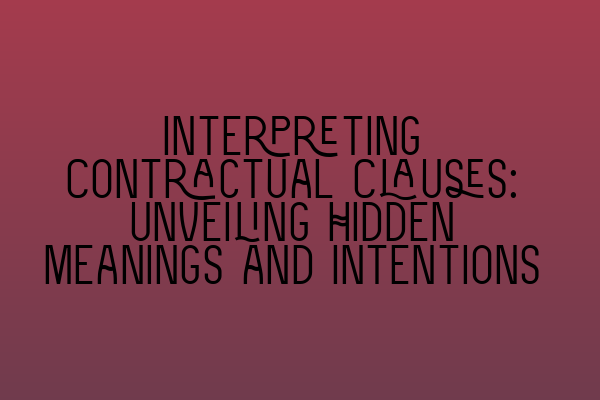Interpreting Contractual Clauses: Unveiling Hidden Meanings and Intentions
As a solicitor specializing in contract law, one of the most crucial skills you need to possess is the ability to interpret contractual clauses accurately. Contracts often contain complex language and legal jargon that can be difficult to navigate. It’s your job to unveil the hidden meanings and intentions behind these clauses and ensure your clients’ interests are protected. In this blog post, we will explore various strategies and techniques to help you become an expert in interpreting contractual clauses.
Before diving into the intricacies of interpretation, it’s important to understand the fundamental principles that guide this process. The key principle is that contractual interpretation should prioritize giving effect to the parties’ intentions. The courts typically view contracts as a means to achieve the parties’ common objective, rather than a mere exercise in linguistic analysis.
One common challenge in interpreting contractual clauses is dealing with ambiguity. Clauses are often drafted vaguely or open to multiple interpretations. This is where the solicitor’s skill in deciphering intent becomes crucial. By analyzing the context, background, and purpose of the contract, you can uncover the true meaning behind ambiguous clauses. It’s also essential to consider the commercial common sense behind the contract and the reasonable expectations of the parties involved.
A useful strategy when interpreting contractual clauses is to pay attention to defined terms. Parties often include definitions within the contract to clarify specific terms used throughout the agreement. These definitions can provide valuable insights into the parties’ intentions and can help resolve ambiguities. By pinpointing the defined terms relevant to the clause in question, you can decipher the intended meaning more accurately.
Additionally, it’s important to consider the rules of construction that the courts apply when interpreting contracts. There are various established legal principles that guide the interpretation process. For instance, contra proferentem is a rule that favors the interpretation that is most favorable to the non-drafting party. Understanding and applying these rules will help you navigate complex contractual language and argue for your client’s desired interpretation.
In some cases, it may be necessary to resort to external evidence to interpret contractual clauses. This evidence can include correspondence between the parties, previous agreements, or industry customs and practices. Such evidence can shed light on the parties’ intentions and assist in resolving ambiguities.
Another crucial aspect to consider is the interplay between specific and general clauses within a contract. Specific clauses typically prevail over general clauses, as they demonstrate a more specific intention of the parties. By identifying and analyzing the hierarchy of the clauses, you can discern the relative importance and intent behind each provision.
Technology has transformed the legal industry, and contract analysis is no exception. Utilizing AI-powered contract analysis tools can streamline the process and help you unearth hidden meanings more efficiently. These tools can quickly identify relevant clauses, analyze their language, and provide insights into common interpretations. Integrating technology into your practice can significantly enhance your efficiency and accuracy in interpreting contractual clauses.
As a solicitor, it’s essential to stay updated on developments in contract law and interpretation. Regularly reading industry publications, attending seminars, and participating in professional development courses will provide you with the necessary knowledge and insights to excel in this field. For instance, FQPS offers a comprehensive range of SQE 1 and SQE 2 preparation courses that can help you enhance your understanding of contract law and interpretation. Additionally, practicing SQE 1 exam questions and taking practice mocks can strengthen your abilities in analyzing and interpreting contractual clauses.
In conclusion, interpreting contractual clauses is a critical skill for solicitors specializing in contract law. By focusing on the parties’ intentions, analyzing the context and purpose of the contract, and leveraging defined terms and rules of construction, you can unveil the hidden meanings and intentions behind contractual clauses. Incorporating technology and staying updated on industry developments will further enhance your expertise in this area. So, whether you’re just starting your career as a solicitor or looking to refine your skills, investing in improving your abilities in interpreting contractual clauses will undoubtedly benefit your clients and set you apart as a trusted legal professional.
Related Articles:
– SQE 1 Practice Exam Questions
– SQE 1 Practice Mocks FLK1 FLK2
– SQE 2 Preparation Courses
– SQE 1 Preparation Courses
– SRA SQE Exam Dates
